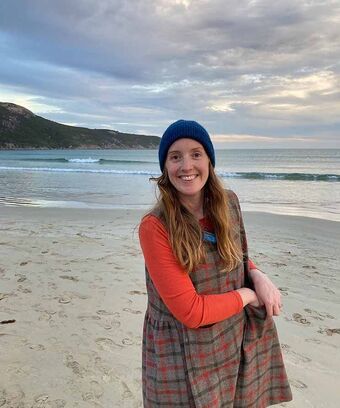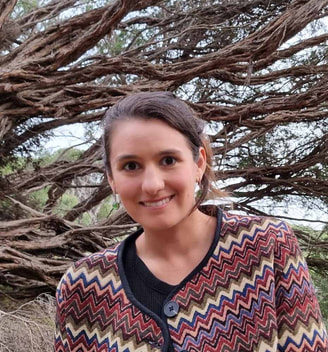 Lucinda Bain at her special place
Lucinda Bain at her special place By Catherine Watson
LUCINDA Bain has won the 2022 Bass Coast Prize for Non-Fiction with The Prom, a personal interrogation of the writer’s place in nature in the midst of a climate emergency.
Lucinda, who wins $5000 for her essay, showed the value of perseverance after a third equal placing in the 2020 prize and an unsuccessful entry last year.
The judges said of The Prom: “Lyrical writing, tying past, present and future: the acknowledgement of the past, the fear and beauty of the present, the ever-diminishing hope for the future. It feels slightly bleak, yet ends on a hopeful, simple (yet profound) fact …
LUCINDA Bain has won the 2022 Bass Coast Prize for Non-Fiction with The Prom, a personal interrogation of the writer’s place in nature in the midst of a climate emergency.
Lucinda, who wins $5000 for her essay, showed the value of perseverance after a third equal placing in the 2020 prize and an unsuccessful entry last year.
The judges said of The Prom: “Lyrical writing, tying past, present and future: the acknowledgement of the past, the fear and beauty of the present, the ever-diminishing hope for the future. It feels slightly bleak, yet ends on a hopeful, simple (yet profound) fact …
“Fantastic interrogation of the complexities of living under a constant and imminent existential threat in the context of privileged albeit sometimes mundane modern living.”
Lucinda, who is based in Eltham but has strong Gippsland connections, is currently working on a collection of essays exploring concepts of motherhood and climate change. “It’s a daunting subject but it's such a powerful driver. I can’t NOT write about it.”
With $10,000 in prize money, the Bass Coast Prize is one of the richest prizes for short non-fiction in Australia. It’s also one of the few regional prizes, with entry open to writers living in Gippsland or who have a strong link to the region.
The 26 entries came from all parts of Gippsland. Fifteen were by women and 11 by men, and the writers ranged from the late teens to the late 80s.
Bass Coast Shire Council, the West Gippsland Regional Library Corporation and ArtSpace Wonthaggi sponsored this year’s prizes.
This is the fourth year of the competition and the first time it has included a section for shorter works between 2000 and 4000 words.
Lucinda, who is based in Eltham but has strong Gippsland connections, is currently working on a collection of essays exploring concepts of motherhood and climate change. “It’s a daunting subject but it's such a powerful driver. I can’t NOT write about it.”
With $10,000 in prize money, the Bass Coast Prize is one of the richest prizes for short non-fiction in Australia. It’s also one of the few regional prizes, with entry open to writers living in Gippsland or who have a strong link to the region.
The 26 entries came from all parts of Gippsland. Fifteen were by women and 11 by men, and the writers ranged from the late teens to the late 80s.
Bass Coast Shire Council, the West Gippsland Regional Library Corporation and ArtSpace Wonthaggi sponsored this year’s prizes.
This is the fourth year of the competition and the first time it has included a section for shorter works between 2000 and 4000 words.
 Grace Elizabeth Elkins
Grace Elizabeth Elkins Grace Elizabeth Elkins, a Cape Woolamai writer and teacher, won the short section with She and I (and truth and fiction), an intriguing exploration of the way an adolescent illness has informed personal perspective and memory.
Jim Connelly, a retired teacher and church minister living in Warragul, was second with One Morning, on the Way to School, a rollicking snapshot of the daily school bus ride from Garfield to Warragul in the 1940s.
Cape Paterson author and publisher Kit Fennessy was third with Sands of Time, a witty slice of memoir that seamlessly weaves together metaphysics, geology, history and Jimmy Hendrix.
The judges, Karen Bateman, Linda Cuttriss and Rees Quilford, did not award a second or third prize in the longer section for works between 4000 and 10,000 words.
They noted that while several of the entries had great potential, they needed more work to lift them above the ordinary and truly engage with the reader.
Lucinda Bain, the major winner, said the Bass Coast Prize was a great motivator. “The deadline is 110 per cent important. It’s what drives me to finish a work. And knowing that someone will read my work.”
She said it took her about six months to write The Prom, fitting it around caring for three daughters, part-time work and many other distractions.
“The first draft of the piece is nothing like the one I submitted at the end. I go over and over it a million times, but I enjoy the combing process. Once you’ve got words on the page you’ve got something to work with. It’s like an art work – you can start playing with it.”
Grace Elkins, winner of the short section, is finishing a masters in writing at Deakin University and has had short fiction published in literary journals in Australia and the US.
Grace said she, too, starts with a very rough draft. “I just sit and write and let it flow. That’s the clay, and then I start shaping it. I love the act of playing with words and sentences, reading it aloud and finding the right rhythm.
“A prize like the Bass Coast Prize for Non-Fiction is so empowering. It motivates you to go through the whole writing cycle, editing to refine it. It makes you feel your work matters.”
Jim Connelly, a retired teacher and church minister living in Warragul, was second with One Morning, on the Way to School, a rollicking snapshot of the daily school bus ride from Garfield to Warragul in the 1940s.
Cape Paterson author and publisher Kit Fennessy was third with Sands of Time, a witty slice of memoir that seamlessly weaves together metaphysics, geology, history and Jimmy Hendrix.
The judges, Karen Bateman, Linda Cuttriss and Rees Quilford, did not award a second or third prize in the longer section for works between 4000 and 10,000 words.
They noted that while several of the entries had great potential, they needed more work to lift them above the ordinary and truly engage with the reader.
Lucinda Bain, the major winner, said the Bass Coast Prize was a great motivator. “The deadline is 110 per cent important. It’s what drives me to finish a work. And knowing that someone will read my work.”
She said it took her about six months to write The Prom, fitting it around caring for three daughters, part-time work and many other distractions.
“The first draft of the piece is nothing like the one I submitted at the end. I go over and over it a million times, but I enjoy the combing process. Once you’ve got words on the page you’ve got something to work with. It’s like an art work – you can start playing with it.”
Grace Elkins, winner of the short section, is finishing a masters in writing at Deakin University and has had short fiction published in literary journals in Australia and the US.
Grace said she, too, starts with a very rough draft. “I just sit and write and let it flow. That’s the clay, and then I start shaping it. I love the act of playing with words and sentences, reading it aloud and finding the right rhythm.
“A prize like the Bass Coast Prize for Non-Fiction is so empowering. It motivates you to go through the whole writing cycle, editing to refine it. It makes you feel your work matters.”